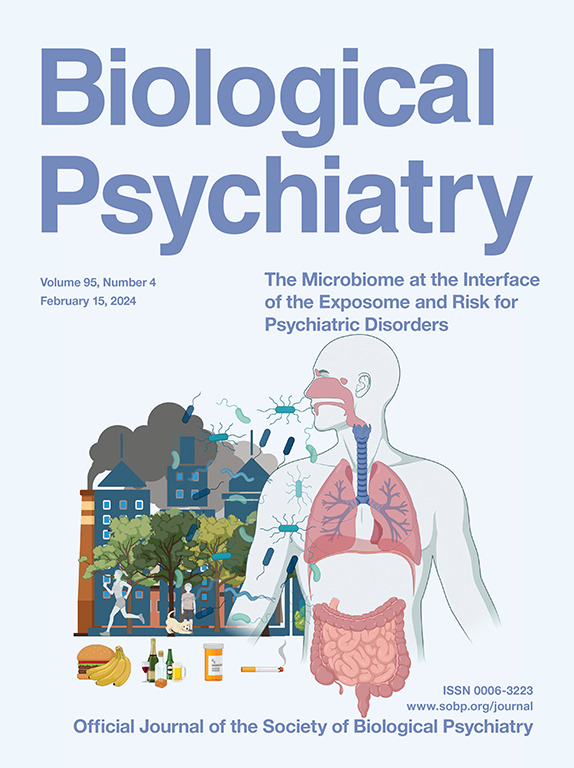通过网络控制理论,睡眠剥夺对大脑状态动态的影响与多巴胺D2受体的可用性有关。
IF 9.6
1区 医学
Q1 NEUROSCIENCES
引用次数: 0
摘要
背景:睡眠不足(SD)会对大脑功能产生负面影响。大多数脑成像研究调查了睡眠剥夺对 "静态 "脑功能的影响。SD对大脑功能动态的影响及其与分子变化的关系仍相对缺乏研究:我们使用功能性核磁共振成像检查了一晚自毁后与休息清醒(RW)相比的大脑静息状态动态,并使用网络控制理论评估了它们与 PET-[11C]raclopride 测量的纹状体大脑多巴胺 D2 受体可用性(D2R)之间的关系:SD降低了停留时间和持续概率,对两种大脑状态的影响最大,一种状态的特点是默认模式网络活跃度高而背侧注意网络活跃度低,另一种状态的特点是额顶叶网络活跃度高而躯体运动网络活跃度低。利用网络控制理论,我们发现在 SD 之后,大脑状态转换所需的控制能量总体上有所增加,但对不同大脑状态转换的影响各不相同。在 SD 和 RW 条件下,控制能量需求与转换概率呈负相关,并解释了 SD 引起的转换概率变化。能量分布的改变与SD诱导的纹状体D2R分布变化有关:这些研究结果表明,急性 SD 后,内部和外部导向的大脑状态发生了改变,并表明大脑状态转换的能量需求与纹状体 D2R 的调节有关。本文章由计算机程序翻译,如有差异,请以英文原文为准。
Sleep Deprivation Effects on Brain State Dynamics Are Associated With Dopamine D2 Receptor Availability Via Network Control Theory
Background
Sleep deprivation (SD) negatively affects brain function. Most brain imaging studies have investigated the effects of SD on static brain function. SD effects on functional brain dynamics and their relationship with molecular changes remain relatively unexplored.
Methods
We used functional magnetic resonance imaging to examine resting-brain state dynamics after one night of SD compared with rested wakefulness (N = 41) and assessed the association of brain state dynamics with striatal brain dopamine D2 receptor availability measured by positron emission tomography [11C]raclopride using network control theory.
Results
SD reduced dwell time and persistence probabilities, with the strongest effects in two brain states, one characterized by high default mode network and low dorsal attention network activity and the other by high frontoparietal network and low somatomotor network activity. Using network control theory, we showed that after SD, there was an overall increase in the control energy required for brain state transitions, with effects varying for different brain state transitions. Control energy requirement was negatively associated with transition probabilities under SD and restful wakefulness and accounted for SD-induced changes in transition probabilities. Alteration in the energy landscape was associated with SD-induced changes in striatal D2 receptor distribution.
Conclusions
These findings demonstrate altered occurrence of internally and externally oriented brain states following acute SD and suggest an association with energy requirements for brain state transitions modulated by striatal D2 receptors.
求助全文
通过发布文献求助,成功后即可免费获取论文全文。
去求助
来源期刊

Biological Psychiatry
医学-精神病学
CiteScore
18.80
自引率
2.80%
发文量
1398
审稿时长
33 days
期刊介绍:
Biological Psychiatry is an official journal of the Society of Biological Psychiatry and was established in 1969. It is the first journal in the Biological Psychiatry family, which also includes Biological Psychiatry: Cognitive Neuroscience and Neuroimaging and Biological Psychiatry: Global Open Science. The Society's main goal is to promote excellence in scientific research and education in the fields related to the nature, causes, mechanisms, and treatments of disorders pertaining to thought, emotion, and behavior. To fulfill this mission, Biological Psychiatry publishes peer-reviewed, rapid-publication articles that present new findings from original basic, translational, and clinical mechanistic research, ultimately advancing our understanding of psychiatric disorders and their treatment. The journal also encourages the submission of reviews and commentaries on current research and topics of interest.
 求助内容:
求助内容: 应助结果提醒方式:
应助结果提醒方式:


